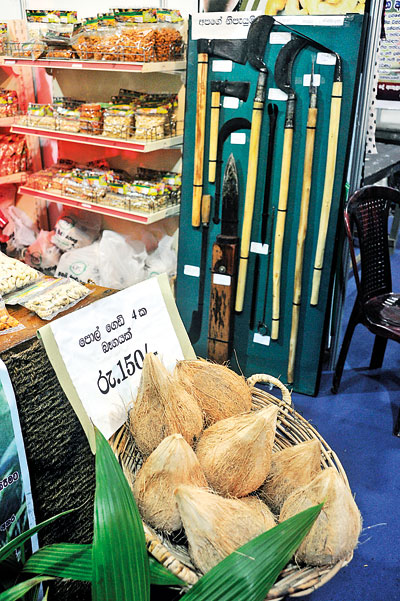Coconuts in crisis: Traders make huge profit at the cost of consumer
The latest crises facing the coconut industry in Sri Lanka is a complaint from the Coconut Growers Association of Sri Lanka (CGASL) that their farm gate price has crashed to a new low of Rs. 23 to 25 from around Rs. 45 in July.

File picture of the price of coconuts some years ago compared to today's prices
Ranjith Dias, a former president of the CGASL and a veteran coconut grower grappling to uplift the industry for almost last 50 years along with the association, told the Business Times that the price they get for coconuts is insufficient to meet the cost of production per nut which is now around Rs. 30 to 45.
In the same breath, he said that a coconut is now sold in the open market at around Rs. 65. Unfortunately, the large profit margin between the farm gate price of Rs. 25 and the selling price in the open market of Rs. 65 benefits the middleman and the authorities are either unable or not interested in stopping this exploitative practice.
He said that the sudden drop in the farm gate price is due to the increase in the crop and the improved weather with the rain reflected in the increase in the coconut crop.
Mr. Dias said that to get over the crisis and to stabilize the prices immediate action has to be taken to export fresh coconut without cess as a crisis mitigation priority.
He said: “Earlier fresh coconut were exported but was stopped due to shortfall of crop, yet there is a heavy demand for our coconut in the foreign market. I would strongly request the Export Development Board to initiate action immediately, in consultation with the Coconut Development Authority to resume export of fresh nuts with a view to stabilize the farm gate price.”
He said that the price mechanism of coconut is unrealistic as the farm gate price is determined according to a formula that has been around for a few decades. There are a number of other coconut products such as virgin coconut oil, coconut water, coconut oil, coconut cream, coconut powder, coconut milk, etc and the prices of these items should also be taken into consideration when the formula is computed and the formula should be reviewed to solve the crisis, he said.
Mr.Dias said that if there is no solution to the crisis, the grower will get thoroughly demoralised and the application of fertilizer and other nutrients will naturally be differed resulting in crop loss in months to come.
Cryshantha Jayawardena, Executive Committee Member, CGASL, said that due to the inclement dry weather in 2016 and 2017 a drop in the crop resulted in a sharp increase in coconut prices going up to as high as around Rs.100.
He said the coconut yield dropped by around 50 per cent and also weight of the nut dropped by around 40 per cent while the farm gate price peaked at Rs. 55.
He said that the country needs around 240 million nuts per month for domestic consumption and industry use and owing to the shortfall in 2017, the coconut processing industry lobbied for the importation of frozen coconut kernel and in mid-June 2017, 1751 metric tons of coconut kernels were imported which is equivalent to 5.2 million nuts.
He said the landed cost of kernel when converted to a whole nut works to around Rs. 56 excluding the value addition that accrues when local nuts are used from the derived bi-products – husk, parings, shell and coconut water, the cost of frozen coconut kernel. Thus, only few industrialists ventured into imports, he said resulting in the suspension of imports.
He points out that to have an adequate coconut supply for consumption and industry, an action oriented viable coconut growing sector must be promoted to ensure a sustainable price to the grower.
During 2016/ 2017 though prices increased, owing to the low nut weight and reduction of yields, the farmers did not obtain an enhanced income. They managed to sustain their plantation by irrigation and moisture conservation practices at additional costs.
However, with abundance of rain during the 2017 North East monsoon and the 2018 South West monsoon, the coconut nut yields have improved. The Coconut Research Institute (CRI) predicted a crop yield increase for 2018 as against 2017.
Though an import tax is levied on the import of palm oil, some of which are suspected to be substandard, it has also become a major hindrance to the coconut industry as this substandard palm oil is adulterated with coconut oil and sold as pure coconut oil with no action from the Consumer Affairs Authority to stop adulterated coconut oil being sold.
The CGASL is of the opinion that only the authorities and various state agencies involved in coconut cultivation could save the crippling coconut industry.


